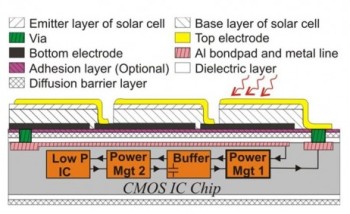Jan 3 2011
Researchers from the University of Twente's MESA+ Institute for Nanotechnology have developed a new microchip that directly combines photovoltaic cells. The team led by Professor Jurriaan Schmitz partnered with colleagues from the Debye Institute of Utrecht University and the Nankai University in China to conduct the research.
 Researchers at the University of Twente's MESA Institute for Nanotechnology has allowed for the direct placement of solar cells onto microelectronics
Researchers at the University of Twente's MESA Institute for Nanotechnology has allowed for the direct placement of solar cells onto microelectronics
The autonomous microsystem includes efficient solar cells integrated on the electronics to create minimal-power devices that are useful indoors and for industrial serial manufacturing. Semiconductor Components group developed the microchip at the MESA+ Institute for Nanotechnology. In addition, the STW Technology Foundation helped in conducting the research.
The microchip is utilized as a base with a layer-by-layer application of solar cell on it. Therefore, the design offers an effective manufacturing process with minimal use of materials. The researchers used CIGS (copper - indium - gallium – selenide) or amorphous silicon solar cells for the project because the electronics are prone to damage. The solar cells generate adequate power to enable the microprocessors to function indoors or in low light.
According to the tests conducted, the solar cells and electronics operate accurately. J. Schmitz et al. presented the paper, titled ‘Above-CMOS a-Si and CIGS Solar Cells for Powering Autonomous Microsystems’ at the International Electron Device Meeting, held in San Francisco, last year.